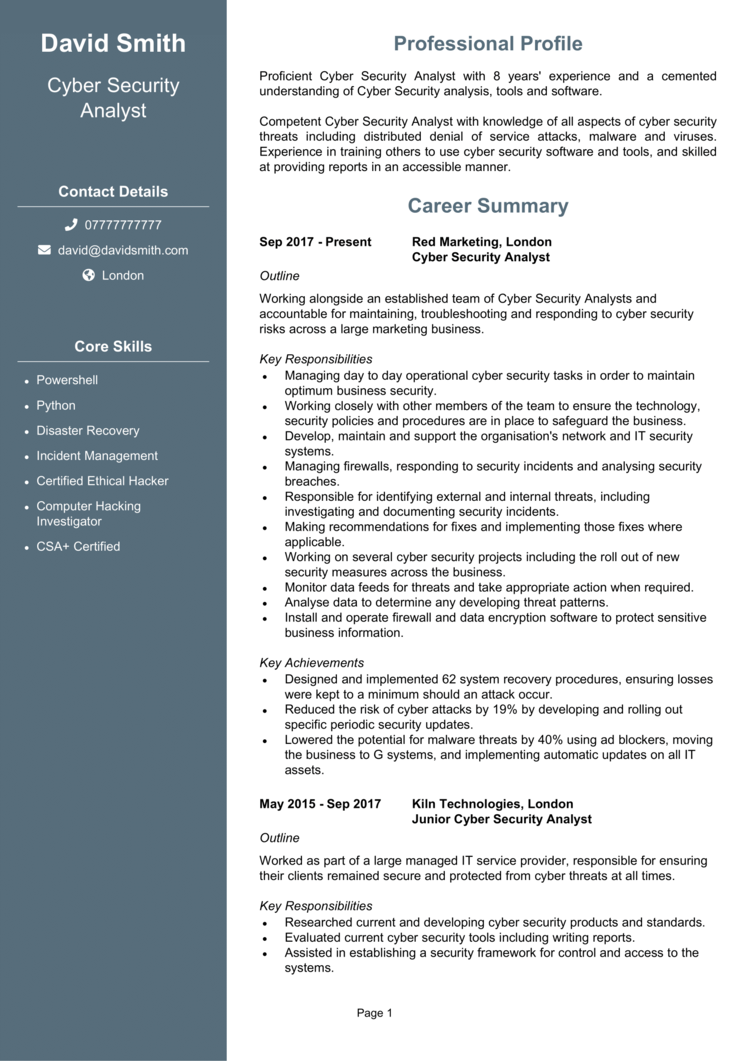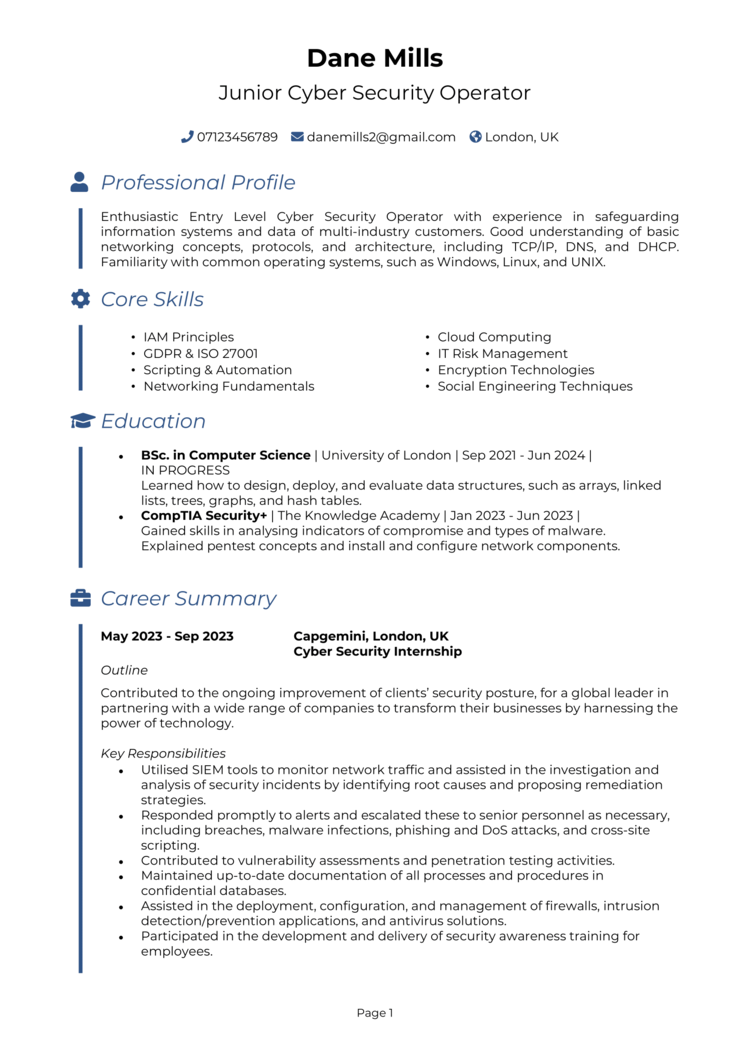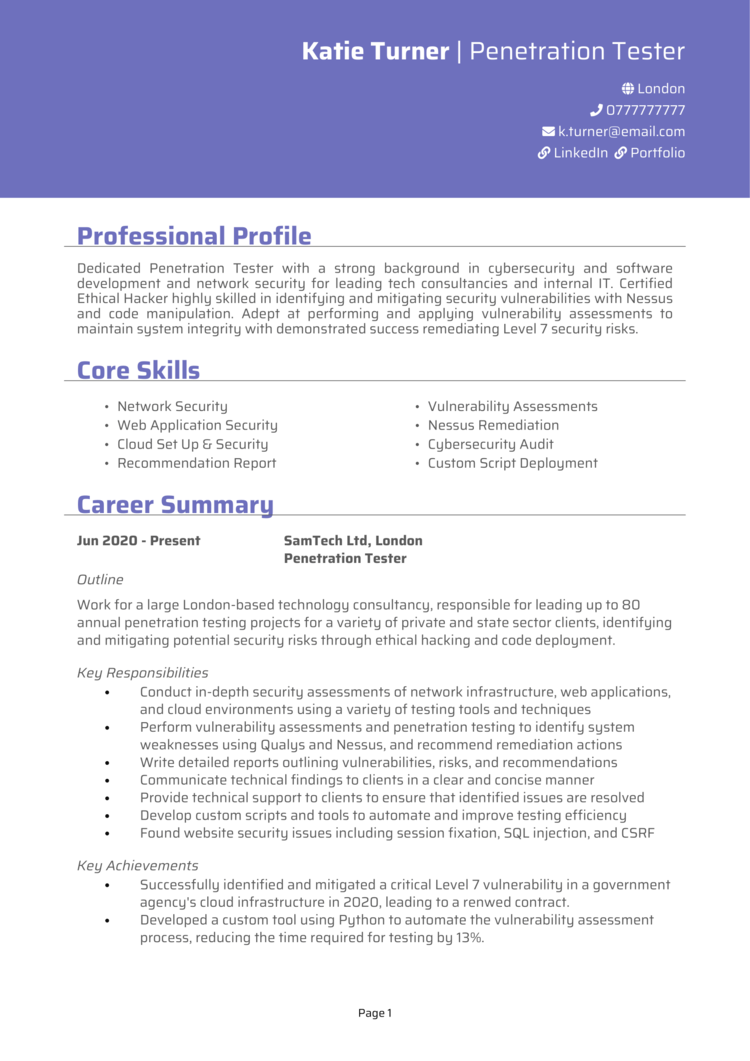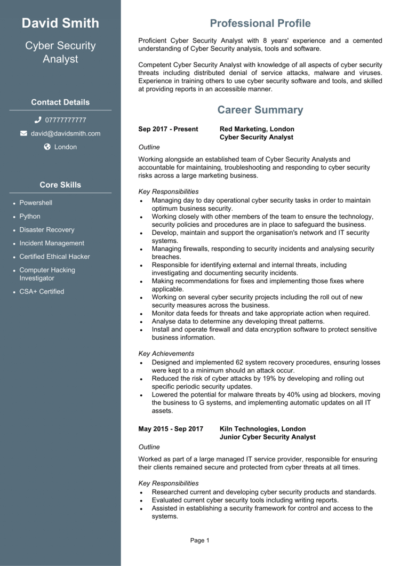Think you’ve got what it takes to keep hackers at bay and firewalls standing strong? As a Cyber Security professional, you’re the digital equivalent of a vault door – strong, reliable, and impossible to crack
But before you can save organisations from breaches and ransomware attacks, you need to tackle one important task: getting hired.
This guide, complete with Cyber Security CV examples, will show you how to showcase your technical expertise, and create a CV that wows recruiters and hiring managers.
Cyber Security Analyst CV

Cyber Security Consultant CV

Entry Level Cyber Security CV

Ethical Hacker CV

Penetration Tester CV

How to write your Cyber Security CV
Learn how to create your own interview-winning Cyber Security CV with this simple step-by-step guide.
A Cyber Security CV needs to prove you’re the go-to expert for protecting sensitive data and defending against digital threats. It’s your chance to highlight your certifications, practical experience, and problem-solving skills.
Once you’ve read through this guide, you’ll be able to write a CV that captures your ability to secure systems and prevent attacks, ensuring you’re the top choice for any organisation’s IT defence team.
Structuring your Cyber Security CV


Your CV structure needs to be as secure and organised as the systems you’ll be protecting. A clear and logical layout ensures recruiters can quickly find the information they need to assess your expertise.
Here’s how to structure your Cyber Security CV:
- Name and contact info – These contact details sit at the top, so eager employers can quickly get in touch. Adding a professional picture of yourself is entirely optional but rarely needed.
- Profile – Open with a summary of your cyber security experience, certifications, and approach to safeguarding systems.
- Core skills – Highlight your technical abilities, from penetration testing to network monitoring.
- Work experience – Present your professional history in reverse chronological order, focusing on your key contributions to system security.
- Education – List your academic qualifications and any relevant certifications and awards.
- Additional info – Optionally, include hobbies or interests in your CV that show off your analytical or problem-solving skills.
The best way to format your Cyber Security CV


A disorganised CV is like a poorly configured firewall – nobody’s going to trust it to get the job done. Keep it sleek, professional, and error-free to pass the recruiter’s penetration test. Even a top cyber security expert would be overlooked if their CV format is riddled with mistakes and typos.
Here’s how to format your Cyber Security CV to ensure a good CV:
- Bullet points – Break down your experience into concise, scannable sections that let a recruiter quickly skim through it.
- Divide sections – Use clear headings and spacing to guide recruiters through your CV.
- Use a clean font – Choose a professional font that’s readable on any device – no encryption necessary.
- Keep it the right length – Two pages tends to be the perfect length to provide detail without overwhelming (or boring) the reader.
What is a Cyber Security CV profile?


Your profile is your opportunity to prove you’re the first line of defence any organisation needs against digital threats. It should get across what benefits you’d be providing to the company to convince the recruiter of your usefulness.
Cyber Security CV profile examples
Profile 1
Experienced Cyber Security Specialist with six years of experience in financial services, specialising in network security and incident response. Skilled in using SIEM tools, penetration testing, and developing strategies that reduced security breaches by 30 percent. Proficient in securing critical systems against evolving threats.
Profile 2
Proficient Cyber Security Analyst with four years of experience in healthcare IT, focusing on protecting sensitive data and ensuring compliance with HIPAA regulations. Adept at implementing firewalls, monitoring network activity, and conducting vulnerability assessments to mitigate risks.
Profile 3
Dedicated Cyber Security Manager with over eight years of experience leading security operations for global organisations. Skilled in building threat intelligence programs, managing SOC teams, and driving initiatives that reduced downtime caused by cyberattacks by 40 percent. Experienced in ISO 27001 compliance and risk management.
What to include in your Cyber Security CV profile
Here are some tips on what to put in your Cyber Security CV profile:
- Where you’ve worked – Mention the industries or organisations you’ve safeguarded, from finance to healthcare.
- Your top qualifications – Clearly note your key certifications like CISSP, CISM, or CEH.
- Technical expertise – Tell the recruiter which tools, frameworks, or methodologies you’ve mastered.
- Cyber threats you’ve mitigated – Quickly mention the types of attacks or vulnerabilities you’ve dealt with.
- Programming languages you know – As a tech role, you’d be expected to have some coding knowledge – list which languages you can use.
- Systems you’ve secured – Highlight whether you’ve protected cloud infrastructures, corporate networks, or databases.
Core skills section


Your core CV skills section is like a firewall in CV form – it needs to clearly show recruiters that you’ve got the expertise to block, defend, and mitigate any threat. Tailor this section to the role, highlighting the specific tools or practices the employer values most.
Top skills for your Cyber Security CV
- Network Security – Implementing firewalls, intrusion detection systems, and VPNs to protect networks from unauthorised access and threats.
- Penetration Testing – Simulating cyberattacks to identify vulnerabilities in systems, applications, and networks.
- Incident Response – Developing and executing strategies to detect, contain, and mitigate cybersecurity breaches effectively.
- Endpoint Protection – Managing security measures for devices such as laptops, mobile phones, and servers to prevent unauthorised access.
- Threat Intelligence – Monitoring emerging cyber threats and leveraging intelligence to strengthen security measures.
- Cryptography – Applying encryption algorithms to secure sensitive data and ensure confidentiality.
- Identity and Access Management (IAM) – Managing user identities and permissions to ensure secure and restricted access to resources.
- Compliance and Auditing – Ensuring organisational adherence to security standards like GDPR, ISO 27001, and PCI DSS through regular audits.
- Security Information and Event Management (SIEM) – Using tools like Splunk or ArcSight to analyse security logs and detect anomalies.
- Vulnerability Management – Scanning, prioritising, and remediating software and hardware vulnerabilities to reduce attack surfaces.
Work experience


Your work experience section is where you demonstrate your ability to defend organisations against digital threats in practical settings. Focus on the impact of your contributions, from preventing breaches to streamlining security protocols.
Always list jobs in reverse chronological order, giving more detail to the most pertinent roles.
How to structure jobs

- Outline – Briefly describe the organisation, your role, and the scope of your security responsibilities.
- Responsibilities – Explain tasks like threat monitoring, vulnerability assessments, or policy implementation.
- Achievements – Highlight measurable outcomes, such as reducing incidents by X% or improving response times.
Sample jobs for Cyber Security
Cyber Security Operator | SafeGuard Financials
Outline
Monitored and protected IT infrastructure for a leading financial services provider, focusing on detecting and mitigating security threats. Ensured compliance with industry standards to safeguard sensitive data.
Responsibilities
- Configured and maintained firewalls, intrusion detection systems, and endpoint security tools.
- Conducted vulnerability assessments and penetration tests to identify and address weaknesses.
- Monitored network activity using SIEM tools like Splunk and QRadar to detect anomalies.
- Responded to and mitigated security incidents, including phishing attacks and malware outbreaks.
- Collaborated with the IT team to implement system patches and updates promptly.
Achievements
- Reduced successful phishing attacks by 25 percent through staff training initiatives.
- Decreased response times to security incidents by 20 percent by automating workflows.
- Recognised for achieving a 98 percent success rate in preventing unauthorised access attempts.
Cyber Security Consultant | Shield Solutions
Outline
Provided cyber security consulting services for businesses in the retail and healthcare sectors, focusing on building robust security architectures and compliance with regulations like GDPR.
Responsibilities
- Developed and implemented security frameworks tailored to client needs.
- Performed risk assessments to identify and prioritise potential vulnerabilities.
- Advised clients on best practices for securing sensitive customer and patient data.
- Configured and optimised security systems, including endpoint protection and encryption tools.
- Delivered workshops and training sessions to improve client staff awareness of cyber threats.
Achievements
- Improved client security posture by 35 percent through tailored risk mitigation strategies.
- Achieved 100 percent compliance with GDPR for all healthcare clients within six months.
- Secured a £500K contract renewal through consistently high-quality consulting services.
Cyber Security Manager | WorldWide Innovations
Outline
Led the cyber security operations for a multinational technology company, managing a team of analysts and engineers to protect critical systems and data. Focused on proactive threat detection and response.
Responsibilities
- Established and led a Security Operations Centre (SOC) to monitor threats 24/7.
- Developed and executed a company-wide incident response plan.
- Managed budgets of £1M+ to implement advanced security solutions.
- Collaborated with C-suite executives to align security policies with business objectives.
- Conducted regular audits to ensure compliance with ISO 27001 and other standards.
Achievements
- Reduced system downtime caused by cyberattacks by 40 percent through improved threat monitoring.
- Cut security-related costs by 15 percent by consolidating tools and streamlining processes.
- Mentored and promoted five team members, enhancing the department’s overall expertise.
Education section


The education section is critical for showing your foundational knowledge and specialised training in cyber security.
Include degrees in IT or related fields and certifications like CISSP or CompTIA Security+. For newcomers, focus on relevant coursework, personal projects, or internships that highlight your potential.
Always list your qualifications in reverse chronological order, starting with the most recent.
Key qualifications in Cyber Security
- Certified Information Systems Security Professional (CISSP) – Validates advanced expertise in information security.
- Certified Ethical Hacker (CEH) – Demonstrates the ability to think like a hacker to protect systems.
- CompTIA Security+ Certification – Covers essential cyber security principles for protecting networks and devices.
- GIAC Security Essentials (GSEC) – Focuses on hands-on cyber security knowledge.
- Certified Information Security Manager (CISM) – Highlights expertise in managing and implementing security programs.





